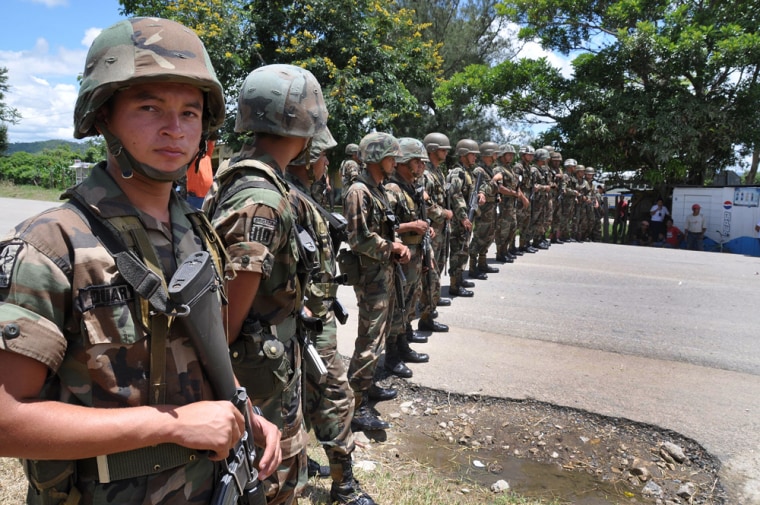Honduras' deposed president was headed toward his nation's border Thursday to prepare a risky return, an attempt to reverse an ouster that is testing the vitality of democracy in Latin America.
The government that sent Manuel Zelaya into exile vows to arrest the elected president if he sets foot in Honduras. Zelaya said he would make a second attempt to return home, likely this weekend, saying U.S.-backed attempts at mediation had broken down.
"I'm going prudently, without guns — I'm a peaceful man," Zelaya told Argentina's Todo Noticias network by telephone Thursday. "I have the right to return to my home and my family and to serve out the mandate that the people gave me at the polls."
All governments in the Western Hemisphere have condemned the coup, in which soldiers acting on orders from Congress and the Supreme Court arrested Zelaya and flew him into exile. Nations on both sides of the political spectrum say Zelaya's return to power is crucial to the region's stability.
Latin America expert Vicki Gass said that if Zelaya's opponents succeed in driving him from power, it could have a ripple effect in a region where left-leaning elected governments are challenging small classes of elites that have ruled many countries for decades.
"Coups could then happen in Peru, where President (Alan) Garcia has a very low approval rating, or in Argentina or in Guatemala," said Gass, an analyst at the Washington Office on Latin America which promotes human rights and democracy. "Constitutional order and rule of law have to be restored."
Sanctions threatened
Zelaya said the mediation efforts, led by Costa Rican President Oscar Arias, had failed after representatives of the interim government flatly rejected the possibility that he might return to the presidency. They say they cannot overturn a Supreme Court ruling forbidding Zelaya's reinstatement.
But Jose Miguel Insulza, secretary-general of the Organization of American States, held out hope that the two sides might still reach a settlement. He said Thursday that neither delegation had officially responded to Arias' proposal, which calls for Zelaya's reinstatement, amnesty for the coup leaders and early elections.
The United States warned of tough sanctions against Honduras if Zelaya is not reinstated, but also said Thursday it does not support Zelaya's plan to return on his own.
"Any step that would add to the risk of violence in Honduras or in the area, we think would be unwise," State Department spokesman P.J. Crowley said in Washington.
In Honduras, Zelaya supporters turned up the pressure, blocking roads throughout the country Thursday and occupying several government buildings in peaceful protests.
It was unclear exactly when or how Zelaya planned to enter the country. Zelaya has set and let pass a series of deadlines for his return, and spokesman Allan Fajardo said Thursday that Zelaya could travel by air, sea, or land from any of Honduras' three neighboring countries.
Fajardo told The Associated Press that Zelaya would set up base Thursday in the Nicaraguan city of Esteli, near the Honduran border, and then figure out his next move. He said Zelaya would be accompanied by family, supporters and journalists.
Threat of arrest
The Honduran military thwarted Zelaya's first attempt to return home July 5 by blocking the runway at the airport in the capital, Tegucigalpa. The flight sparked clashes between Zelaya's supporters and security forces in which at least one protester was killed.
Lorena Calix, a spokeswoman for Honduras' national police, said Thursday that officers were ready to detain Zelaya if he makes another attempt to come home.
"When he comes to Honduras, we have to execute the arrest warrant," she said.
Honduras' Supreme Court ordered Zelaya's arrest before the June 28 coup, ruling his effort to hold a referendum on whether to form a constitutional assembly was illegal. The military decided to send Zelaya into exile instead — a move that military lawyers themselves have called illegal but necessary.
Zelaya's opponents, who objected to his populist and socialist policies, have argued the president was trying to change the constitution to extend his term. Zelaya denies that.
If he is arrested, Zelaya faces four charges of violating governmental order, treason and abusing and usurping power that could bring 43 years behind bars. Prosecutors say they are investigating a raft of other allegations ranging from misappropriation of public funds to drug smuggling — accusations Zelaya says are purely political.
Arias has urged both sides to set an example by becoming the first country in modern history to reverse a coup through a negotiated settlement.
"The clock is ticking fast," Arias said, "and it's ticking against the Honduran people."
More on: Oscar Arias | Organization of American States
